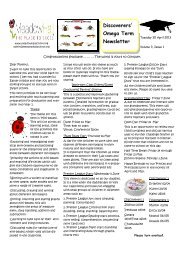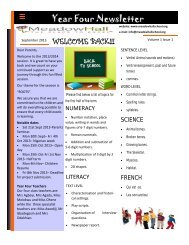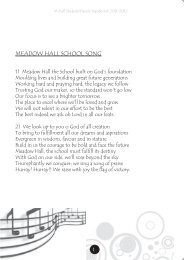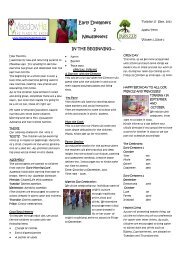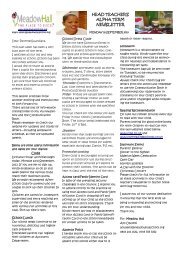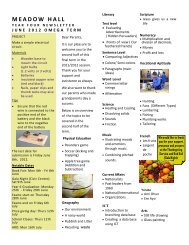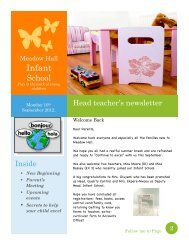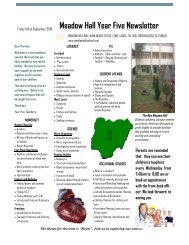Newsletter keystage 3 (1) - Meadow-Hall School
Newsletter keystage 3 (1) - Meadow-Hall School
Newsletter keystage 3 (1) - Meadow-Hall School
Create successful ePaper yourself
Turn your PDF publications into a flip-book with our unique Google optimized e-Paper software.
KEY STAGE 3 NEWSLETTER<br />
Thank God Omega term is here again. We<br />
want to appreciate your support and cooperation<br />
throughout the previous terms<br />
and trust that we will continue to partner in<br />
moving our children to greater heights.<br />
Below are some important events for this<br />
term.<br />
¨<br />
¨<br />
Mother Tongue Day-Thursday,<br />
May 9<br />
French Day/College’s MH Got Talent-<br />
Thursday, May 23<br />
¨ Open Day/Half Term –Friday, May 24<br />
¨ Careers Day–June 7<br />
¨<br />
¨<br />
¨<br />
College Exam—Wednesday, June<br />
12 –Friday 21<br />
Excursion –Monday 24 June<br />
Dinner - July 3rd<br />
¨ Graduation an MI day—July 4<br />
¨ ARD - July 5<br />
ENTRANCE EXAMS!!!<br />
Lagos: <strong>Meadow</strong> <strong>Hall</strong><br />
Entrance examination<br />
comes up on the 4th of<br />
May at 8:30 in the<br />
school premises.<br />
<strong>Meadow</strong> <strong>Hall</strong> will be<br />
conducting its entrance<br />
and transfer examinations<br />
at the following<br />
centres ( states) :<br />
Port Harcourt-Venue:<br />
Sailor’s Pride Educational<br />
Centre, Plot 124 Tombia<br />
Extention GRA Phase 2,<br />
Port Harcourt<br />
Time-:11:30am<br />
Date: Saturday 27th April<br />
2013<br />
Eket & Uyo-Venue:<br />
Life Vision International<br />
<strong>School</strong>s 61 Nepa Line, Uyo<br />
Akwa Ibom State<br />
Time: 10am<br />
Date: Monday 29th April,<br />
2013<br />
Page 1
Omega term scheme of work for Key Stage 3<br />
MATHEMATICS: YEAR 7<br />
1. Number Bases<br />
2. Constructions<br />
3. Solving Equations<br />
4. Transformations<br />
5. Experimental Probability<br />
6. Theoretical Probability<br />
MATHEMATICS: YEAR 8<br />
1. Straight line Graphs of Linear<br />
Equations<br />
2. Pythagoras Rules<br />
3. Arithmetic in the Home and Office<br />
4. Inequalities<br />
5.Angles of Elevation and Depression<br />
2. Bearing and Distance<br />
3. Transformations<br />
4. Net, Surface Area and Volume of<br />
Cones and Cylinders<br />
5. Constructions<br />
6. Data Presentation<br />
YEAR 7: ENGLISH<br />
READING COMPREHENSION<br />
1. Reading of Narrative and non-<br />
Narrative Texts and Poems.<br />
1. Vocabulary and Comment on a<br />
Writers’ use of Language.<br />
2. Summary of Main Ideas.<br />
WRITING<br />
1. Write to Imagine, Explore and<br />
entertain.<br />
2. Planning and paragraphing.<br />
3. Informal and Formal Letters.<br />
GRAMMAR AND PUNCTUATION<br />
(STRUCTURE)<br />
1. Verbs – Types and Usage<br />
2. Tenses<br />
3. Phrases and Clauses<br />
4. Punctuation Marks<br />
SPEAKING AND LISTENING<br />
(SPOKEN ENGLISH)<br />
1. Recognize and Produce Correctly<br />
the Consonant and Vowel Sounds.<br />
2. To Understand Questions heard, and<br />
Supply the Correct Information required.<br />
3. Dialogues<br />
LITERATURE<br />
1. Reading and Writing short Stories.<br />
2. To Study Prescribed Poems and<br />
Prose Texts.<br />
YEAR 8: ENGLISH<br />
READING COMPREHENSION<br />
1. Read Drama Scripts, Leaflets, Letters,<br />
Newspapers, Magazines and Poetry,<br />
2. Vocabulary and Comment on a<br />
Writer’s use of Language.<br />
3. Read to Summarise the main points.<br />
WRITING<br />
1. Write in a Range of Forms for a Variety<br />
of Purposes.<br />
2. Structure Writing using Paragraphs.<br />
3. Write different Types of Letters in<br />
Appropriate Situations.<br />
GRAMMAR AND PUNCTUATION<br />
(STRUCTURE)<br />
1. Tenses<br />
2. Phrase and Clauses<br />
3. Punctution Marks<br />
SPEECH WORK<br />
1. Speech Sounds<br />
2. Vowel Sounds - Monophthongs<br />
and Diphthong<br />
3. Consonant.<br />
LITERATURE<br />
1. Prose Text : The White Wizard by<br />
Tade Adegbindin<br />
2. Some Recommended Poems<br />
French: Yr 7<br />
1. On va en ville<br />
2. Où est le parc ?<br />
3. Où es-tu ? Où vas-tu ?<br />
4. J’aime bien ça (les opinions)<br />
5. Au snack<br />
6. Ma journée<br />
7. Mes matières<br />
8. Mon emploi de temps<br />
9. Le sport et les jeux<br />
French : Yr 8<br />
1. On prépare une fête<br />
2. Au marché<br />
3. Au restaurant<br />
4. Voyages et vacances<br />
5. Au centre de vacances<br />
6. Destination Sénégal<br />
7. Les copains<br />
8. L’argent de poche<br />
9. Techno folie<br />
10. Présent, passé et future<br />
YEAR 7 : AGRIC. SCIENCE<br />
1. Classes and uses of Farm<br />
Animals<br />
2. Economic Empowerment<br />
through Agriculture<br />
3. Marketing of Agric Product<br />
4. Formation, Composition and<br />
Properties of Soil.<br />
YEAR 8: AGRIC SCIENCE<br />
1. Fishery<br />
2. Animal Husbandry<br />
3. Disease-causing Organism<br />
4. Crop plant Diseases<br />
5. Storage of Farm Produce<br />
6. Soil Conservation.<br />
7. Development of Agriculture in<br />
Nigeria<br />
Page 2
BASIC COMBINED SCIENCE:<br />
YEAR 8<br />
1. Environmental pollution (air,<br />
water, soil)<br />
2. Habitats<br />
3. Simple Machines<br />
4. Metals and non Metals<br />
5. Chemistry in everyday Life<br />
6. Sound Energy<br />
7. Magnetism.<br />
Music : Year 7<br />
1. Uses of Music<br />
2. Impact of Music on Human Life<br />
3. African Musical Instruments<br />
4. European Musical Instruments<br />
5. History of Western Art Music<br />
6. African Musical Forms<br />
Music: Year 8<br />
1. Nigerian Musician Akin Euba<br />
2. Life and Works of Western Musicians<br />
3. Intervals and Inversion<br />
4. Triads and Inversions<br />
5. Cadences<br />
Basic technology: Year 7<br />
1. Units of Energy and Power.<br />
2. Basic Emission Theory.<br />
3. Electronic Components.<br />
4. Types of Buildings.<br />
5. Simple Blue Print.<br />
6. Concept of Maintenance.<br />
7. What is a computer?<br />
Basic technology : Year 8<br />
1. Transmission of Electricity<br />
2. Site Preparation in Building Construction<br />
3. Simple Maintenance Methods.<br />
4. Carrier Opportunities in Technology.<br />
5. Production of Wood.<br />
Yoruba<br />
Eto Ilana ise fun Saa Keta Olodun<br />
Keje (Omega Term Year 7)<br />
1. Oge Sise ni ile Yoruba.<br />
2. Ise oro apejuwe.<br />
3. Leta Kiko.<br />
4. Ise Oro Ise.<br />
5. Ewi Apileko.<br />
6. Ise Isenbaye: Agbe ati ilu lilu.<br />
7. Gbolohun Abode/ Eleyo oro Ise<br />
8. Litireso Apileko- Ere onitan.<br />
9. Gbolohun Alakanpo.<br />
10. Litireso Apileko- Oloro Geere.<br />
11. Agbeyewo Ise Saa/ Idanwo.<br />
Eto Ilana ise fun Saa Keta Olodun Kejo<br />
(Year 8)<br />
1. Litireso Apileko – Ere Onitan.<br />
2. Igbagbo sti ero nipa Olodumare.<br />
3. Aroko Oniroyin.<br />
4. Litireso Alohun Ajemesin Ibile.<br />
5. Igbagbo ati ero nipa orisa.<br />
6. Ewi apileko<br />
7. Isomoloruko 1<br />
8. Isomoloruko 2<br />
9. Leta Aigbagbefe.<br />
10. Agbeyewo ise Saa.<br />
11. Idanwo<br />
Home Economics: Year 7<br />
1. Care of the Family House.<br />
2. Home Surroundings.<br />
3. Entertainment in the House.<br />
4. Simple Cooking and Serving Equipment.<br />
5. Cosmetic Production.<br />
6. Sewing Tools and Equipment.<br />
7. Household Crafts.<br />
8. Sewing Practical.<br />
9. Sewing Practical<br />
Year 8 : Home Economics.<br />
1. Seams<br />
2. Seam Finishes<br />
3. Edge Finishes<br />
4. Body Measurement.<br />
5. Basic Pattern Drafting.<br />
6. Sewing Machine.<br />
7. Clothing Practical on Seams and Seams<br />
Finishes.<br />
Science: Year 7<br />
1. Scientific Enquiry<br />
2. People and the Planet<br />
3. Acids and Alkalis<br />
4. Finding the Age of the Earth<br />
5. Classification and Variation<br />
6. Measurement<br />
Year 8: Science<br />
1. Environmental Pollution( air, water<br />
and soil)<br />
2. Habitats<br />
3. Simple Machines<br />
4. Metals and Non-metals<br />
5. Chemistry in everyday Life<br />
6. Sound energy<br />
7. Magnetism<br />
Year 7: PHE<br />
1. Football<br />
2. Traditional Sport<br />
3. Wresting<br />
4. Gender Participation in Sport<br />
5. Child Abuse<br />
6. Praticals<br />
7. Badminton<br />
Year 8: PHE<br />
1. Environmental Pollution<br />
2. <strong>School</strong> Health Programme<br />
3. Basketball<br />
4. Safety and Accidents<br />
5. Body Types<br />
6. Gymnastics and Warm up<br />
7. Rhythmic Activities and Dance<br />
Fine Arts: Year 7<br />
1. Element of Art and Design<br />
2. Principle of Art and Design<br />
3. Still Life Drawing<br />
4. Nature Drawing<br />
5. Sculpture – Papier Mache –<br />
Definition, Materials, Process<br />
6. Modelling- Making Models with<br />
Page 3
Year 8: Fine Arts<br />
1. Museum and Gallery– Meaning, Func<br />
tion and Location<br />
2. Life drawing<br />
3. Popular Cultural Festivals in Nigeria<br />
4. Still- Life drawing<br />
5. Introduction to Craft<br />
6. Local Crafts and their Locations in<br />
Nigeria.<br />
7. Packaging– Function, Processes<br />
Civic Education: Year 7 scheme<br />
1. Our Values<br />
2. Honesty<br />
3. Cooperation<br />
4. Self-reliance<br />
5. Citizenship<br />
6. Rights and Duties of Citizens<br />
7. National Consciousness<br />
8. National Unity<br />
9. Representative democracy<br />
10. Representative democracy<br />
Civic Education: Year 8<br />
1. Integrity<br />
2. Contentment<br />
3. Discipline<br />
4. Courage<br />
5. Nigeria as a federation<br />
6. Relationship between federal,<br />
State and Local Government<br />
7. Leadership<br />
8. The Rule of Law<br />
YEAR 7: SOCIAL STUDIES<br />
1. Assertiveness (1): Meaning<br />
2. Assertiveness (2) Skills<br />
3. Examination Malpractice<br />
4. Cultism and HIV/AIDS<br />
5. Problems Associated with Contemporary<br />
Social Problems in<br />
Nigeria .<br />
6. Images of an Age<br />
7. Negotiation<br />
8. National Unity and Interaction<br />
YEAR 8: SOCIAL STUDIES<br />
1. Revision of last Term’s Work<br />
2. Science, Technology and Society<br />
3. Home Appliances<br />
4. The Civil war in England<br />
5. Finding Help<br />
6. National Economy<br />
7. Advantage of keeping Money in<br />
the Bank<br />
8. National Economy(II) Transporta<br />
tion<br />
9. National Economy (III) Communi<br />
cation<br />
ICT: YEAR 7<br />
WEEKS<br />
TOPICS<br />
1. Revision/Computer Models<br />
2. Building Models<br />
3. Creating Database Structures<br />
4. Testing Hypothesis<br />
5. Control and Monitoring<br />
6. Building a Program<br />
7. Measuring Physical Data<br />
8. Design<br />
9. Carrying out Experiments<br />
ICT: Year 8<br />
1. Revision<br />
2. Introduction to Modelling and Pre<br />
senting Numeric Data<br />
3. Turning the Output into Input<br />
using “Goal Seek”<br />
4. Introducing Randomness into a<br />
Model<br />
5. Introduction: What is a system?<br />
6. Understanding the Problem and<br />
Thinking of Solutions<br />
7. Keeping Records<br />
8. Introduction to Information<br />
9. Revision for Examination<br />
YEAR 7: Business Studies<br />
1. Partnership<br />
2. Limited Liability Company<br />
3. Cooperative Society<br />
4. Introduction to Book keeping<br />
Year 8: Business Studies<br />
1. Introduction to Insurance<br />
2. Ledger<br />
3. Petty Cash<br />
4. Preparation of a Cash Book.<br />
Page 4
Excursion to French <strong>School</strong><br />
SLAM WORKSHOP AT FRENCH SCHOOL<br />
(LYCEE FRANçAIS)<br />
<strong>Meadow</strong> <strong>Hall</strong> College students went to Lycée Français<br />
Louis Pasteur de Lagos (French <strong>School</strong>) Victoria Island Lagos<br />
on the 16th March 2013 for an excursion. They had a<br />
Slam workshop to celebrate the International Day of Francophonie<br />
which was on the 20th March 2013.<br />
The students had the opportunity to interact with the native<br />
speakers, learnt some new French words, sounds and<br />
music.<br />
They were also able to use the sounds learnt to compose<br />
songs and rap to French tunes. It was fun!<br />
MEADOW HALL COLLEGE (The place to<br />
Excel!)<br />
<strong>Meadow</strong> <strong>Hall</strong> Way, 3rd Roundabout, Lekki,<br />
Lagos<br />
08073000556 08025042053, 01-4790146, 01-<br />
4790147<br />
info@meadowhallschool.org<br />
Page 5
DID YOU KNOW???<br />
EXCURSION TO PUNCH IN PIXS<br />
¨<br />
Every time you lick a stamp, you're<br />
consuming 1/10 of a calorie.<br />
· If you yelled for 8 years, 7 months and<br />
6 days, you would have produced<br />
enough sound energy to heat one cup<br />
of coffee.<br />
· The average person falls asleep in<br />
seven minutes.<br />
¨<br />
¨<br />
¨<br />
¨<br />
¨<br />
¨<br />
¨<br />
¨<br />
¨<br />
¨<br />
¨<br />
¨<br />
¨<br />
¨<br />
A crocodile can’t stick its tongue out.<br />
A shrimp’s heart is in its head<br />
More than 50% of the people in the<br />
world have never made or received a<br />
telephone call.<br />
It is physically impossible for pigs to<br />
look up into the sky.<br />
It is impossible to lick your elbow.<br />
Horses can’t vomit<br />
Like fingerprints, everyone’s tongue<br />
print is different.<br />
Donkeys kill more people annually<br />
than plane crashes.<br />
Most lipsticks contain fish scales.<br />
In 10 minutes, a hurricane releases<br />
more energy than all of the world’s<br />
nuclear weapons combined.<br />
Butterflies tastes with their feets.<br />
All polar bears are left handed.<br />
An Ostrich’s eye is bigger than its<br />
brain.<br />
Americans on the average eat 18 acres<br />
of pizza every day.



